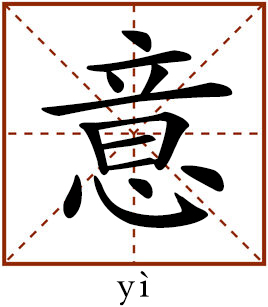Meaning

This common character refers to meaning, intention or significance. When combined with other characters, it forms diverse words and proverbs.
醉翁之意
zuì wēng zhī yì
Zui weng is “an old drunkard,” while zhi yi means “motives.” The common interpretation of this phrase is that the old drunkard cares not for the wine, but for the landscape. The happiness of mountains and streams is obtained in the heart and lodged in wine.
This proverb is derived from a famous piece of prose named The Roadside Hut of the Old Drunkard (Zuiweng Tingji). Its author is a celebrated scholar of the Song Dynasty, Ouyang Xiu (1007-72). Ouyang called himself the Old Drunkard in this line: “…a hut with a spreading roof by the stream, and this is the Roadside Hut of the Old Drunkard… It was given its name by the governor, referring to himself. The governor, coming here with his friends, often gets tipsy after drinking a little; and since he is the most advanced in years, he calls himself the Old Drunkard. He delights less in drinking than in the hills and streams, taking pleasure in them and expressing the feeling in his heart through drinking.” Now this proverb is often used to describe someone who has hidden, deeper motives for doing something.
项庄舞剑,意在沛公
xiàng zhuāng wǔ jiàn, yì zài pèi gōng
Xiang Zhuang was a younger cousin of Xiang Yu (232-202 BCE), who was the “Hegemon-King of Western Chu.” Wu jian means “to perform a sword dance.” Yi means “target” while zai refers to “lies in.” Pei Gong was the Duke of Pei or Liu Bang, who fought against Xiang Yu for supremacy over China.
The origin of the idiom lies in a well-known historical incident, the Feast at Hong Gate (206 BCE), in which Xiang Yu wanted to assassinate Liu to win the Chu–Han Contention. However, Xiang Yu became soft-hearted during the feast, and felt reluctant to kill Liu. Therefore, Xiang Zhuang pretended to perform a sword dance, and tried to find an opportunity to kill Liu. Eventually, his assassination was stopped by Xiang Yu. This saying is used to indicate that one does something while holding the intent to do something else.
(edited by REN GUANHONG)
